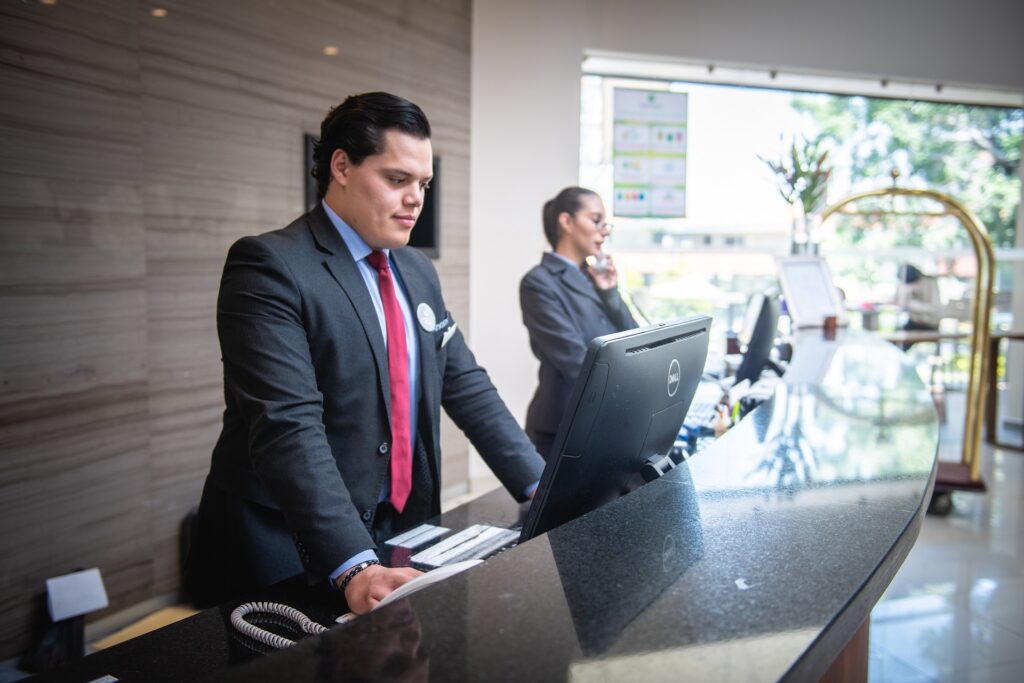From the moment guests start considering a stay to the time they check out, how you communicate with them has a huge impact. Delivering the right blend of warm in-person interactions and engaging digital communications is key to creating lasting bonds – and repeat bookings.
Let’s delve into the key role of communication in guest experience. We’ll cover the types of communication available to hotels, then share our top tips on how to interact effectively with your guests.
What is hotel guest communication?
Guest communication refers to the exchange of information and interactions between hotels and their guests. This encompasses all types of interactions: from in-person to online, and from verbal to non-verbal.
The ultimate goal of all your communication, of course, should be to support a seamless and delightful stay for guests.
What role does communication play in the guest experience?
Communication isn’t just about conveying information, it’s about creating a connection with your guests. The manner in which your hotel communicates has a major impact on the overall guest experience. How and when you interact with guests plays a part in influencing their feelings and actions, including:
- Whether or not they book with you to begin with.
- What they think of your hotel and your team.
- Choosing whether or not to stay again.
- Leaving positive, negative or no feedback.
- Engaging with your offers and extras.
For this reason, you must develop a strategy for your hotel’s communications as part of your broader focus on delivering exceptional guest experiences. This means finding the best ways to interact with guests before, during, and after their stay with you.
Types of communication used in hotels
There are a variety of communication methods for you to take advantage of when engaging with your guests.
- Face-to-Face Interactions: Providing warm greetings and useful exchanges in person is often seen as the cornerstone of a great guest experience. For example, personal interactions at the front desk are considered pivotal in setting the tone for a guest’s stay.
- Digital Communication: Digital channels go beyond the limits of face-to-face contact, allowing you to engage guests at any time in the customer lifecycle. Your hotel’s use of email, SMS/WhatsApp, and social media platforms gives both parties the opportunity to connect pre-, during, and post-stay.
- AI-Powered Communication: Meet the new frontier of ‘always on’ guest communication. Many hotels are now harnessing Artificial Intelligence (AI) to provide quick responses to guest inquiries 24/7.
Today’s effective guest communication should combine more than one of these methods, not rely on one exclusively. Although digital, self-service solutions like contactless check-in have taken off in recent years, many guests still want the option of face-to-face interactions. So prioritize providing the best of both worlds to appeal to all travelers and optimize your guest communication.

How do hotels communicate effectively with guests?
There are many ways to communicate effectively with your guests, using a combination of the methods we outlined above.
1. Keep the lines of communication open
Your guests want to know they can contact you from anywhere, at any time. One of the key strategies for effective guest communication is to always keep your hotel’s lines of communication open. This means guests have the ability to reach out with inquiries, requests or feedback round the clock.
To achieve this 24/7 availability, choose a property management system (PMS) that allows you to view and respond to guest messages from multiple channels, including email and key online travel agencies (OTAs) like Booking.com, Expedia, Airbnb and Vrbo. If your PMS has integrations that open up more communication channels for you, even better! Leverage SMS, WhatsApp and guest apps to make your hotel as available as possible.
You also want to remain responsive to any communications you receive from prospective guests. Nowadays, many hotels utilize AI-powered systems to promptly answer inquiries round the clock. For example, eviivo Concierge™ is the 24/7 digital ally that puts AI at your service. It allows website visitors to receive instant responses to their queries at all times, while freeing your staff to focus on in-house, paying guests.
Included with eviivo’s Guest Manager and easily added to your website, Concierge appears as a chat widget in the corner of the screen, effectively acting as a first point of contact for website visitors.
2. Maintain regular contact with your guests
It’s best to establish contact with your guests early, then maintain regular communication throughout their journey. So consider sending communications to guests before, during, and after the stay that keep them informed and engaged. Once the guest checks in, keep up the engagement levels by combining enthusiastic in-person interactions with online communications to check that they’re satisfied. This makes guests feel valued and provides additional touchpoints for you to enhance the guest experience (and upsell your extra products and services.)
Remember that great communication doesn’t cease after check-out. The communications you send after the guest leaves can help you achieve some substantial wins.
- Want to put a positive button on the overall guest experience? Send them a brief ‘thank you’ message post-stay.
- Looking to grow your online reputation and reduce the risk of guests leaving negative reviews on an OTA listing page? Consider sending a gentle feedback request that lets you screen any subsequent reviews before posting them on your direct channels.
- Eager to capture repeat bookings? Set up a promo for returning guests and automatically send it to those who’ve recently checked-out.
Using a guest management system like eviivo Suite’s Guest Manager allows you to send emails or WhatsApp/SMS messages to guests automatically at all stages of their journey. For added flexibility in the event your guest’s plans change, make sure you also have the ability to pause or delete any scheduled communications.
One more thing: regular communication is good, but over-communicating is a no-no! Leave enough space between messages to ensure you don’t cross the line into pestering your guests.
3. Maintain a consistent tone
Keeping your communications consistent in their tone helps establish your hotel’s brand voice. Whether it’s through written messages, in-person interactions, or online communications, maintaining the same tone improves the guest experience because it strengthens the guest-hotel bond. Think of it this way: when guests receive communications in a consistent brand voice, they come to recognize that voice over time and build positive associations of it.
Make sure your tone of voice conveys certain essential qualities – like being friendly and approachable – while maintaining unique characteristics that help set you apart. You can achieve this by setting up tone of voice guidelines that let your staff know the ‘dos and don’ts’ of both digital and face-to-face communication. Use your customer service training to set shared expectations about employees’ verbal communication. Give them guidelines to follow, but enough freedom to avoid coming across as robotic in their interactions.

4. Deliver great face-to-face interactions at the front desk
Although contactless options at hotels have boomed in recent years, check-in is still the touchpoint where guests are most likely to interact with your staff in person for the first time. In fact, hospitality statistics show that 60% of hoteliers report using a standard check-in process with front desk agents, while 31.5% offer an assisted self-service check-in process. In either case, that first face-to-face interaction between guests and staff is happening.
So make sure your front desk staff’s demeanor and professionalism leave a lasting (positive!) impression. It’s crucial you train staff to provide warm and personalized service through both verbal and non-verbal communication. To cover the verbal must-dos, train staff to ask the right questions at check-in. By doing so, they’ll learn enough about each guest to be able to go the extra mile and offer them some personalized recommendations.
In addition, emphasize the importance of non-verbal communication in creating the best experience possible. Set your staff guidelines and expectations around body language, eye contact and facial expressions. These non-verbal cues can help underline and make clear what you’re communicating in words. Getting that right reduces the risk of any confusion and helps build the bond with guests.
5. Provide key information pre-stay
Guests want to arrive already equipped with the key information they need to make the most of their stay. This means you should proactively reach out to them before their arrival to provide important details such as:
- Check-in instructions
- Your amenities
- Local attractions
- Parking options
- Wi-fi access information
These useful and thoughtful communications set a positive tone for the upcoming stay.
Consider going a step further and reach out to guests before their stay to meet any unique needs they may have. For example, let’s say you learn your guest is visiting for an event. Equipped with this info, you’re able to provide them with directions to the venue or recommendations for nearby restaurants – all before they check in!
6. Centralize guest messaging in one inbox
One potential challenge when managing your guest communications is keeping track of the different online channels you use to send and receive messages. These may include key OTA channels, email, WhatsApp and SMS. The last thing you want is to be so overwhelmed by messages from multiple channels that you lose track and leave guests without any response at all!
To ensure that no quest query goes unanswered, streamline communication channels into a single unified messaging inbox. Using a tool that brings communications from multiple channels together in one place makes it easier to monitor interactions and allows you to deal with queries efficiently. This helps you keep that all-important guest experience optimized.
eviivo Suite’s Conversations inbox is the first in the industry to integrate messages from the following sources:
- Booking.com, Expedia, Airbnb, Vrbo, and Google
- WhatsApp and SMS
- Direct bookings and reviews
- Transcripts of interactions between website visitors and eviivo Concierge
In addition to centralizing all these communications, the Conversations inbox also lets hoteliers set up templated ‘quick responses’ and access AI-suggested replies, so they’re able to respond to common queries faster than ever.

7. Stay on top of your reviews
Monitoring and responding to online reviews, whether positive or negative, shows your hotel’s commitment to engaging with guests. Remember that constructive engagement can turn negative experiences into positive outcomes. If you encounter negative reviews or complaints online, apologize publicly on the review platform and continue the interaction privately from there to reach a resolution.
Work up a store of stock responses that you can tweak for each new review. This helps you save time in comparison to writing up each response from scratch. To get started, download our review response templates.
For more control over your online reputation, opt for a guest management software, like eviivo Suite‘s Guest Manager, that allows you to manage reviews from Airbnb, Vrbo, and direct bookings in one inbox, as well as set up auto-review templates to provide feedback on Airbnb and Vrbo guests.
8. Engage with guests on social media
You should also aim to respond to comments and tags on your hotel’s social media channels. This simple action shows how engaged you are with your guests.
Social media is your opportunity to display your hotel’s unique personality on a public forum, so in these instances we recommend shying away from using stock or canned responses. Instead, designate team members to provide personalized, thoughtful and engaged responses whenever you receive comments or are tagged by a guest.
Who knows, this response may be the deciding factor in whether that commenter stays again – or that gets a browsing social media user to make their first booking with you!
9. Personalize communications where possible
‘Ordinary’ is over. Your job as a hotelier is to make your guests feel truly special during their stay. Tailoring messages to individual guests’ preferences and needs makes them feel uniquely valued and understood, which helps form a great guest experience.
One avenue where you should personalize communications is during face-to-face interactions. Staff’s interactions with guests should always feel authentic and specific to each traveler. So, emphasize the importance of starting conversations with guests. Train staff to ask the guest about their reasons for visiting and their hopes for their stay. The guest’s responses should inspire your staff to provide recommendations that are uniquely tailored to them.
Personalization is equally as possible – and important – with your digital guest communications. Here, personalizing can take the form of small but effective touches that show an extra level of attention. For example:
- Using the guest’s first name in as many communications as possible.
- Tailoring your review and social media responses to be specific to the guest’s experience.
Take it a step further and reach out with individual one-off communications to show you’re invested in the guest’s stay. For example, if a guest uses one of your messaging platforms to set up a spa treatment, you may wish to send them a short message the next day asking whether they enjoyed it. By injecting just this one extra interaction into your guest communications, you appear more attentive and considerate.
Running personalized promotions that are exclusive to your website is another fantastic way to capture attention and influence specific targets. Use unique promo codes or member IDs to set up promotions based on the recipient’s previous behaviors, such as a “Get 10% off your next stay” promo for a regular guest or corporate customer.
Wrapping things up
In conclusion, effective communication is a vital ingredient in the recipe for a delicious guest experience. By utilizing a combination of digital tools, personalized interactions, and consistent messaging, you’ll be able to create a memorable and enjoyable stay that keeps guests coming back for more.
Using a PMS like eviivo Suite’s Guest Manager that integrates key guest communication tools allows you to:
- Handle hotel guest communication more efficiently with a unified, AI-powered guest messaging inbox.
- View and respond to reviews in one place.
- Keep guests engaged by automating communications to send pre-, during- and post-stay.
- Support prospective guests 24/7 by harnessing the power of AI to respond to queries with eviivo Concierge.
Mastering Hotel Guest Communication: 9 Ways To Get It Just Right
Key Takeaways
- Guest communication encompasses all the interactions your hotel has with guests, including in-person and digital, plus verbal and non-verbal.
- The way your hotel communicates impacts the guest experience, influencing overall impressions of your hotel, as well as guests’ booking behaviors.
- Combine face-to-face interactions, digital communications, and AI-powered responses as part of a comprehensive guest communication strategy.
- Use your various communication methods to be available, responsive and maintain regular contact with your guests (without pestering them!)
- Consider centralizing messaging from various sources (major OTAs, WhatsApp & SMS, direct bookings and reviews, AI chatbot transcripts) in one unified inbox
- Balance keeping your tone of voice consistent with personalizing your communications where possible. This helps to build guest loyalty and engagement.
- Consider using AI-powered tools like eviivo’s Concierge and AI-suggested replies feature to manage routine communications. This frees your team to focus on personalizing service for in-house and paying guests.
- Automate key guest communications pre-, during and post-stay to help your team save time while keeping guests informed and engaged.
- eviivo’s award-winning Guest Manager lets you master hotel guest communication by automating key communications, centralizing messaging from various sources in one AI-powered inbox, and giving staff time back to deliver superb in-house interactions.


